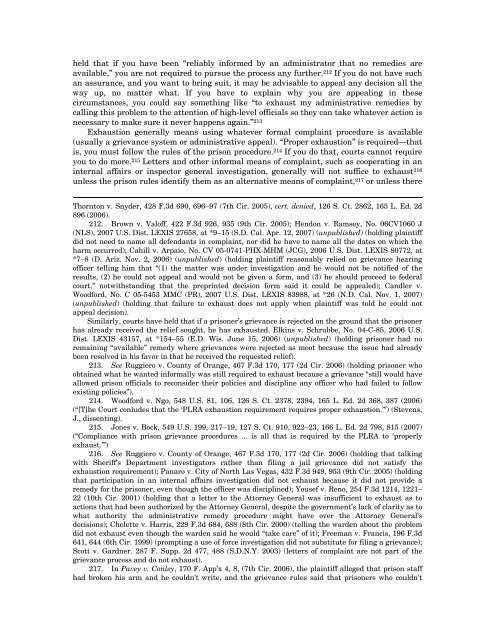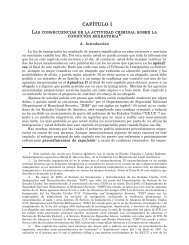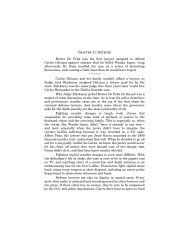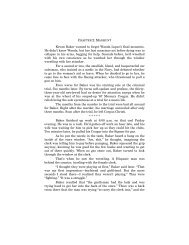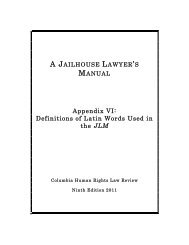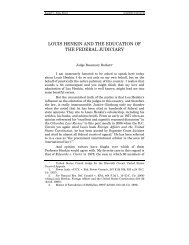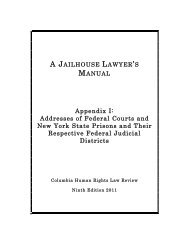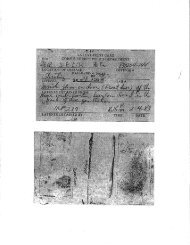A Jailhouse Lawyer's Manual Chapter 14 - Columbia Law School
A Jailhouse Lawyer's Manual Chapter 14 - Columbia Law School
A Jailhouse Lawyer's Manual Chapter 14 - Columbia Law School
You also want an ePaper? Increase the reach of your titles
YUMPU automatically turns print PDFs into web optimized ePapers that Google loves.
held that if you have been “reliably informed by an administrator that no remedies are<br />
available,” you are not required to pursue the process any further. 212 If you do not have such<br />
an assurance, and you want to bring suit, it may be advisable to appeal any decision all the<br />
way up, no matter what. If you have to explain why you are appealing in these<br />
circumstances, you could say something like “to exhaust my administrative remedies by<br />
calling this problem to the attention of high-level officials so they can take whatever action is<br />
necessary to make sure it never happens again.” 213<br />
Exhaustion generally means using whatever formal complaint procedure is available<br />
(usually a grievance system or administrative appeal). “Proper exhaustion” is required—that<br />
is, you must follow the rules of the prison procedure. 2<strong>14</strong> If you do that, courts cannot require<br />
you to do more. 215 Letters and other informal means of complaint, such as cooperating in an<br />
internal affairs or inspector general investigation, generally will not suffice to exhaust 216<br />
unless the prison rules identify them as an alternative means of complaint, 217 or unless there<br />
Thornton v. Snyder, 428 F.3d 690, 696–97 (7th Cir. 2005), cert. denied, 126 S. Ct. 2862, 165 L. Ed. 2d<br />
896 (2006).<br />
212. Brown v. Valoff, 422 F.3d 926, 935 (9th Cir. 2005); Hendon v. Ramsey, No. 06CV1060 J<br />
(NLS), 2007 U.S. Dist. LEXIS 27658, at *9–15 (S.D. Cal. Apr. 12, 2007) (unpublished) (holding plaintiff<br />
did not need to name all defendants in complaint, nor did he have to name all the dates on which the<br />
harm occurred); Cahill v. Arpaio, No. CV 05-0741-PHX-MHM (JCG), 2006 U.S. Dist. LEXIS 80772, at<br />
*7–8 (D. Ariz. Nov. 2, 2006) (unpublished) (holding plaintiff reasonably relied on grievance hearing<br />
officer telling him that “(1) the matter was under investigation and he would not be notified of the<br />
results, (2) he could not appeal and would not be given a form, and (3) he should proceed to federal<br />
court,” notwithstanding that the preprinted decision form said it could be appealed); Candler v.<br />
Woodford, No. C 05-5453 MMC (PR), 2007 U.S. Dist. LEXIS 83988, at *26 (N.D. Cal. Nov. 1, 2007)<br />
(unpublished) (holding that failure to exhaust does not apply when plaintiff was told he could not<br />
appeal decision).<br />
Similarly, courts have held that if a prisoner’s grievance is rejected on the ground that the prisoner<br />
has already received the relief sought, he has exhausted. Elkins v. Schrubbe, No. 04-C-85, 2006 U.S.<br />
Dist. LEXIS 43157, at *154–55 (E.D. Wis. June 15, 2006) (unpublished) (holding prisoner had no<br />
remaining “available” remedy where grievances were rejected as moot because the issue had already<br />
been resolved in his favor in that he received the requested relief).<br />
213. See Ruggiero v. County of Orange, 467 F.3d 170, 177 (2d Cir. 2006) (holding prisoner who<br />
obtained what he wanted informally was still required to exhaust because a grievance “still would have<br />
allowed prison officials to reconsider their policies and discipline any officer who had failed to follow<br />
existing policies”).<br />
2<strong>14</strong>. Woodford v. Ngo, 548 U.S. 81, 106, 126 S. Ct. 2378, 2394, 165 L. Ed. 2d 368, 387 (2006)<br />
(“[T]he Court conludes that the ‘PLRA exhaustion requirement requires proper exhaustion.’”) (Stevens,<br />
J., dissenting).<br />
215. Jones v. Bock, 549 U.S. 199, 217–19, 127 S. Ct. 910, 922–23, 166 L. Ed. 2d 798, 815 (2007)<br />
(“Compliance with prison grievance procedures ... is all that is required by the PLRA to ‘properly<br />
exhaust.’”)<br />
216. See Ruggiero v. County of Orange, 467 F.3d 170, 177 (2d Cir. 2006) (holding that talking<br />
with Sheriff’s Department investigators rather than filing a jail grievance did not satisfy the<br />
exhaustion requirement); Panaro v. City of North Las Vegas, 432 F.3d 949, 953 (9th Cir. 2005) (holding<br />
that participation in an internal affairs investigation did not exhaust because it did not provide a<br />
remedy for the prisoner, even though the officer was disciplined); Yousef v. Reno, 254 F.3d 12<strong>14</strong>, 1221–<br />
22 (10th Cir. 2001) (holding that a letter to the Attorney General was insufficient to exhaust as to<br />
actions that had been authorized by the Attorney General, despite the government’s lack of clarity as to<br />
what authority the administrative remedy procedure might have over the Attorney General’s<br />
decisions); Chelette v. Harris, 229 F.3d 684, 688 (8th Cir. 2000) (telling the warden about the problem<br />
did not exhaust even though the warden said he would “take care” of it); Freeman v. Francis, 196 F.3d<br />
641, 644 (6th Cir. 1999) (prompting a use of force investigation did not substitute for filing a grievance);<br />
Scott v. Gardner. 287 F. Supp. 2d 477, 488 (S.D.N.Y. 2003) (letters of complaint are not part of the<br />
grievance process and do not exhaust).<br />
217. In Pavey v. Conley, 170 F. App’x 4, 8, (7th Cir. 2006), the plaintiff alleged that prison staff<br />
had broken his arm and he couldn’t write, and the grievance rules said that prisoners who couldn’t


